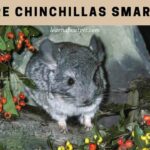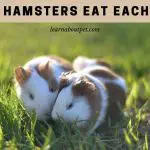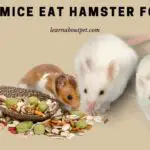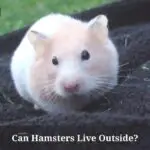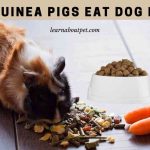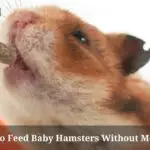Because chinchillas and hamsters are both rodents, it can be very tempting to have them share food. For instance, if you keep both chinchillas and hamsters, and you happen to run out of chinchilla food one day, it can be tempting to consider giving the chinchilla the hamster food.
But just before doing so, you may find yourself grappling with questions – like whether chinchillas can eat hamster food, whether hamster food is beneficial for chinchillas and what food is ideal for chinchillas. Read on, for answers.
Can chinchillas eat hamster food? The simple answer is no. Hamster food can’t provide sustenance for chinchillas. There are different foods that are formulated for different animals. Thus, hamster food may not be beneficial for a chinchilla. Worse still, some hamster food ingredients may be harmful to chinchillas (as they are actually toxic to them).
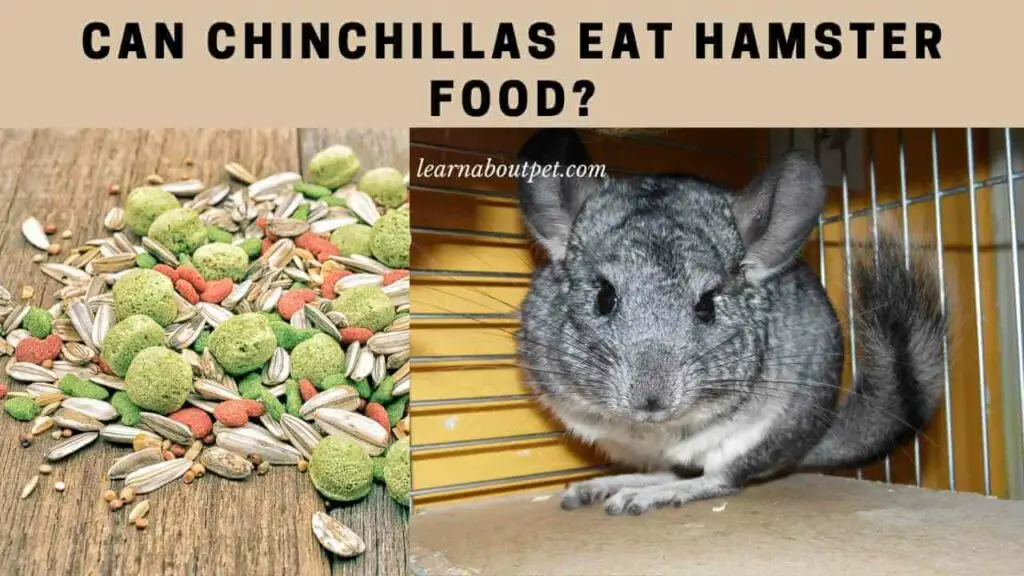
Therefore you need to desist from giving chinchillas hamster food. Even for the short term, hamster food can still be harmful to chinchillas. It is important to remember that though both are rodents; they have very different nutritional requirements.
Furthermore, their digestive systems function very differently. Therefore things that a hamster may digest with ease may cause major complications in a chinchilla. And things that hamsters eat without issue may be very toxic to chinchillas.
Can Chinchillas Eat Hamster Food?
Chinchillas cannot eat hamster food. The hamster food will not be nutritionally beneficial to them. In fact, the hamster food is likely to be harmful to them. It is important to remember the natural chinchilla diet is mainly made up of hay and grass, with some twigs and leaves in between. On the other hand, the natural hamster diet is mainly made up of seeds, nuts and the occasional insects.
Therefore the chinchilla digestive tract has adaptations for digestion of (mainly) hay, grass, twigs and leaves. On the other hand, the hamster digestive tract has adaptation for digestion of things like nuts and seeds. Therefore if you feed a chinchilla hamster food, he will almost certainly have difficulties digesting it.
In an attempt to digest these things, the chinchilla may end up with digestive tract blockages. At the very least, he is likely to get stomach upsets. Because the chinchilla can’t properly digest the hamster food, it means that the food is likely to be useless to him nutritionally.
Some hamster foods have high fat content. This is potentially toxic to chinchillas, as it can cause liver problems. The higher protein in hamster food can, on the other hand, cause kidney and liver problems to chinchillas.
Chinchillas ideally require dry food. Yet hamster food tends to be rather moist. This moisture can cause bloating in the chinchillas. And chinchilla bloating, unlike say, human bloating, is a very big issue.
On another note, some hamster food may have too much sugar content. This is sugar that can cause seizures in chinchillas. Therefore there are so many reasons on account of which hamster food isn’t ideal for chinchillas.
Chinchilla Food Vs Hamster Food Nutrition
The people who pose the can chinchillas eat hamster food question are likely to benefit from an exposition on chinchilla food versus hamster food nutrition requirements. In fact, this should be the starting point when attempting to answer the can chinchillas eat hamster food question.
Chinchilla food is naturally mainly in the form of hay and grass, as well as twigs and leaves. Hamster food, on the other hand, is mostly in the form of seeds and nuts. While a chinchilla requires very much fiber (up to 30% of the diet), the hamster requires less fiber(in the 6-15% range). On the other hand, while the chinchilla requires little carbohydrate (like 35% of the diet), the hamster requires much more (like 64%). For reasons such as these, hamster food is not ideal for chinchillas.
It is worth mentioning that besides not being nutritionally beneficial to chinchillas, hamster food can in fact be toxic to them.
Can Chinchillas Eat Hamster Food In Emergency For One Day?
Chinchillas shouldn’t eat hamster food at all. Not even for emergency for one day. That is because hamster food can be toxic to them. Thus, giving your chinchilla hamster food even for one day may cause complications that ultimately kill it. So it is not something you should do.
This clarification is important, because many of the people who pose the can chinchillas eat hamster food question tend to be individuals who have found themselves in emergency situations (with no chinchilla food). So they consider using hamster food to fill the gap.
But the truth of the matter is that it may be better to let the chinchilla go hungry. This may be better than giving him potentially toxic hamster food.
Can Chinchillas Eat Hamster And Gerbil Food?
Chinchillas shouldn’t eat hamster and gerbil food. Different animals have different nutritional requirements. And foods that are formulated for specific animals shouldn’t be given to others. At best, hamster and gerbil food won’t be nutritionally beneficial to the chinchilla. At worst, the hamster and gerbil food can actually be harmful to the chinchilla.
Usually, the folks who pose the can chinchillas eat hamster food question tend to be people who keep many types of pets. So they consider having the pets share food. But that is not ideal. The best approach is to ensure that each type of pet gets the foods that are specially formulated for its needs.
Can Hamsters And Chinchillas Eat The Same Food?
Hamsters and chinchillas shouldn’t eat the same food. True, they are both rodents. But their nutritional needs are different. And they come from very different natural habitats. Therefore their bodies have evolved very differently. Food that may be beneficial to one may be toxic to the other. Therefore, it is not proper to have hamsters and chinchillas eat the same food.
What Is A Good Chinchilla Diet?
Often, the people who pose the can chinchillas eat hamster food question turn out to be individuals who may benefit from a lesson: on what goes into the making of a good chinchilla diet. So, indeed, what is a good chinchilla diet? Well, the first component of a good chin diet is plenty of hay.
Fresh hay is particularly ideal, if you can manage to get it. Most chinchilla owners prefer Timothy hay: ideal the second cut Timothy hay.
A good quality pellet is another key component of a good chinchilla diet. But you have to ensure that it is specifically a chinchilla pellet, and not for any other animal.
The third component of a good chinchilla diet is plenty of water. Because the chinchilla diet is heavy on fiber, its digestion requires plenty of water.
With regard to chinchilla treats, you may consider alfalfa hay and oat hay.
Other things that a chinchilla can eat are celery, kale and squash. An occasional sweet potato or ordinary potato may be alright, as may be an occasional carrot.
The things to avoid in a chinchilla diet are seeds and nuts (which the chinchilla is unable to digest properly). Fruits too may have levels of sugar that a chinchilla is unable to handle. An occasional raisin may not do much harm, but it has to be a once in a while treat. Dry rose hips and fresh herbs may also serve as treats for chinchillas.

What Can Chinchillas Eat List?
Typically, right after the can chinchillas eat hamster food question comes another one: on what exactly chinchillas can eat. Now one of the things that chinchillas can (and should) eat as a staple is hay. Chinchillas can also eat pellets. But these shouldn’t be pellets formulated for other animals, but rather, pellets formulated specifically for chinchillas.
Unfortunately, some vendors may want to pass off other animals’ pellets for chinchilla pellets. And some manufacturers may want to create a one-size-fits-all pellet for all rodent pets. This is why some people opt to steer from pellets altogether.
Where you have to give pellets, you need to be sure that those are hay-based pellets. So the idea is to avoid seed-based or nut-based pellets, which seem to be the majority in the market.
Chinchillas are also able to eat small insects. These can provide them with the protein they need. But you need to give your chinchilla insects sparingly. Too much protein in a chinchilla can cause kidney and liver problems. Mealworm, crickets and fish meal can be potential sources of protein – but only give them very sparingly.
Chinchillas are even able to eat raisins and whole bread toast occasionally. The most important thing here is to ensure that the chinchilla gets very little of the raisin or toast. And this should only be once in a while. If you make it a daily affair, you are very likely to cause your chinchilla a disease.
Carrots, kales, celery, squash and potatoes are other things that a chinchilla may eat on occasion. But you have to give these very sparingly. For instance, you need to remember that at a certain level, potato can become toxic to chinchillas.
What Foods Are Poisonous To Chinchillas?
Most nuts and seeds can be poisonous to chinchillas. Others that are poisonous are the likes of avocado, peas and spinach. Cabbage too can be poisonous to a chinchilla (yet it is so tempting to feed cabbage to your chin). Bananas are out of question for chinchillas, as they are poisonous to them. So is asparagus and peanut. Even broccoli and lettuce can be poisonous to chinchillas.
So it becomes clear that many of the things that hamsters eat with ease are actually poisonous to chinchillas. This is why people who pose the can chinchillas eat hamster food question are typically advised never to give hamster food to chinchillas.
Foods that are high in fat are also potentially toxic to chinchillas. This is because too much fat can cause liver disease in a chinchilla. This is not something that may kill a chinchilla right away. But it is something that can cause a slow and painful death to a chinchilla in due course.
What Should I Do If I’m Out Of Chinchilla Feed For One Day?
One approach you can use is that of giving small carrots. Another alternative is that of giving the chinchilla kales, celery or squash if you have it. But don’t give the likes of spinach and cabbage, as they can be poisonous to the chinchilla.
If you have raisins, you can give them to the chinchilla. Whole grain bread toast can work as well. But many of these are things you should only give for the day. Then go out looking for hay (or hay-based pellets) the very next day.
What you need to desist from is the temptation to give your chinchilla another animal’s food. As we said while answering the can chinchillas eat hamster food question, such food can be harmful. So even if you are out of chinchilla feed for one day, you should desist from giving him hamster food.
Final Verdict – Can Chinchillas Eat Hamster Food
Can chinchillas eat hamster food? Hamster food is not good for chinchillas. It is not something that chinchillas are likely to benefit from nutritionally. In fact, it is something that is likely to be harmful to chinchillas. Therefore you shouldn’t give hamster food to chinchillas.

If you happen to keep both hamsters and chinchillas, you need to resist the temptation of having them share their foods. And even if you happen to run out of chinchilla food for one day, you still need to resist the temptation to give it hamster food.
As a pet lover, make sure to learn about pet more and give your pet Chinchilla a good and comfortable life as they live their life with you. Chinchillas are generally smart and they’d love to have your company!

Welcome to Learn About Pet. My name is Rajkumar Ravichandran and I love all pets, travel, and amazing food. I write about my passion and personal experience caring for multiple pets in this blog! ❤️
Post Disclaimer
DISCLAIMER: THIS BLOG OR WEBSITE, "Learn About Pet", DOES NOT PROVIDE YOU WITH MEDICAL ADVICE AND IS NOT A SUBSTITUTE FOR MEDICAL ADVICE. ALWAYS GET IN TOUCH WITH YOUR PERSONAL VETERINARIAN AND USE INFORMATION HERE AS GENERAL ADVICE.
The information, including but not limited to, text, graphics, images and other material contained on this website are for informational purposes only. No material on this site is intended to be a substitute for professional veterinary advice, food recommendation, diagnosis, or treatment. Always seek the advice of your veterinarian or other qualified health care provider with any questions you may have regarding a medical condition or for pet food related questions.
